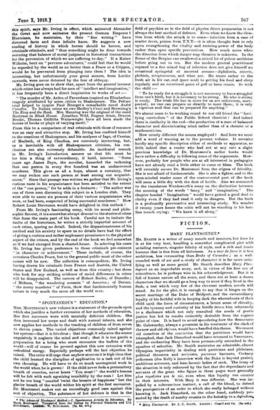" SPONTANEOUS " EDUCATION.* MME. MoisTrasones new volume is a
statement of the grounds upon which she justifies a further extension of her methods of education. Her first successes were with mentally deficient children. She then increased her scope and dealt with normal infants, and she now applies her methods to the teaching of children of from seven to eleven years. The varied objections commonly raised against her system—that it is frivolous ; that though it educates the senses exquisitely it neglects the mind and soul ; that it is too gentle a preparation for a being who must encounter the buffets of the world—will of course be pressed against this new extension with redoubled energy. Especially perhaps will the last objection be raised. The critic will urge that anyhow at seven it is high time that the child learned the discipline of application to a task not of his own choosing. He will have to do so much uncongenial work in the world when he is grown ! If the child never feels a premonitory breath of coercion, never hears " You must !" the world's lessons will be felt with such agonizing Sensibility by the man I Let him not be too long "nuzzled 'twist the breasts of happiness" lest the glacier breath of the world wither his spirit at the first encounter. Dr: Montessori makes out an exceedingly good' case against this sort of objection. The gubstance of her defence is that in the
• The Advanced Montessori Msthoe.—.1. Spontaneous Activity In Mansion. By Maria Wontowort. Translated from the Italian by Florence Simmons and Lily Hutchinson. Larks: W. Heinemann. Ps. id. net.]
field of psychics as in the field of physics direct preparation is not always the best method of defence. Even when we know the direc- tion from which the attack is to come—infection from a case of scarlet fever, poison from T.N.T.—it is often thOught best to rely upon strengthening the vitality and resisting-power of the body rather than upon specific preventives. How much more when the direction from which danger may threaten is unknown. In the Rome of the Borgias one swallowed a mixed lot of poison antidotes before going out to ten. But the modern general practitioner exposed to a fine mixed bag of infection does not give himself an occasional syringeful of assorted serums—diphtheria, enteric, phthisis, streptococcus, and what not. He trusts rather to the fresh air in his car, and (poor soul) to getting his food and sleep regularly and an occasional game of golf or lawn tennis. So with the child To be ready for a struggle it is not necessary to have struggled from one's birth, but it is necessary to be strong. He who is strong is ready. The trials life has in store for us are unforeseen, unex- pected; no one can prepare us directly to meet them; it is only a vigorous soul that can be prepared for anything."
We almost seem to be working round to our old friend the " forti- fying curriculum " of the Public School classicist ! And indeed there is similarity in the end—the production of a man of balanced character and discriminating mind rather than of a chemist or a mathematician.
How utterly different the means employed ! And here we must add a word of warning as to the present volume. It contains hardly any specific description either of methods or apparatus, so little indeed that a reader who had not at any rate a slight previous knowledge of Dr. Montessori's earlier books would have rather a difficulty in following some of the arguments. How- ever, probably few people who are at all interested in pedagogics have not already read a little either to curse or bless. The book will certainly secure Dr. Montessori from the stigma of frivolity. She is not afraid of fundamentals. She is also a fighter, and to the open-minded reader some of the controversial part of the book will seem a little dry with the dust of battle. Also we commend to the translators Wordsworth's essay on the distinction between the meaning of the words " fancy " and " imagination." The chapter headed " Imagination " would have gained a good deal in clarity even if they had read it only to disagree. But the book is a profoundly provocative and interesting study. We wonder if twenty years hence the critic will not be standing in his last- line trench crying; " We knew it all along."


























 Previous page
Previous page